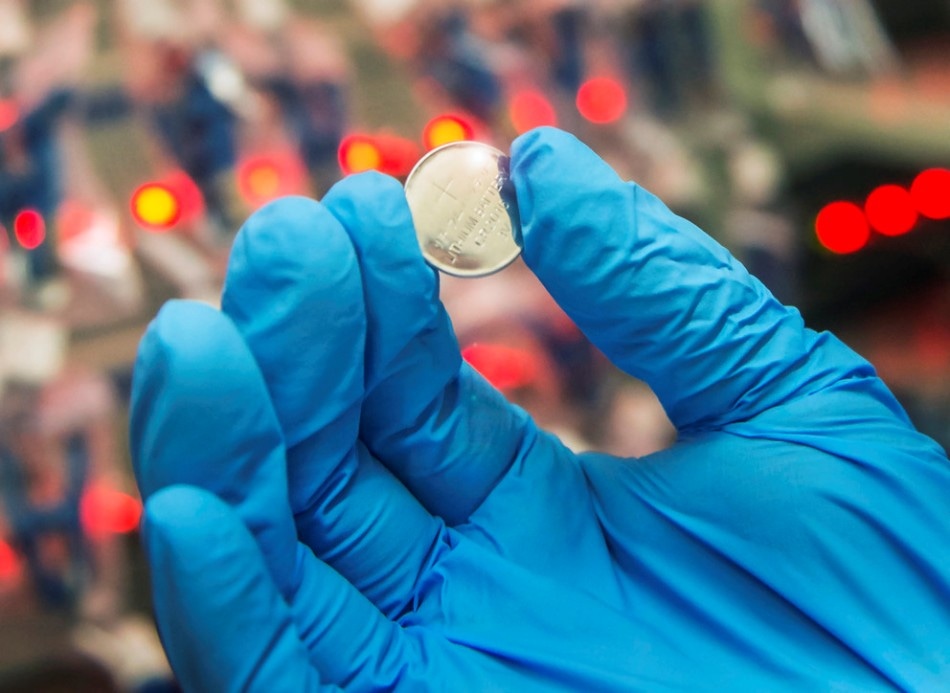Oct 13 2017
Leaky sulfur-acid automobile batteries may be a thing of the past, but the current generation of lithium batteries still continues to have some disadvantages. Now, a group of Engineers at Penn State have developed a unique kind of lithium sulfur battery that could be safer, more efficient and less expensive.
 One of the lithium sulfur coin batteries being developed in Penn State's Energy Nanostructure Laboratory (E-Nano) (Image: Patrick Mansell)
One of the lithium sulfur coin batteries being developed in Penn State's Energy Nanostructure Laboratory (E-Nano) (Image: Patrick Mansell)
We demonstrated this method in a coin battery. But, I think it could eventually become big enough for cell phones, drones and even bigger for electric vehicles.
Donghai Wang, Associate Professor of Mechanical Engineering, Penn State
Ideally, lithium sulfur batteries should be a potential candidate for the advanced rechargeable batteries, but these are known to have inherent problems. In lithium batteries, the charge transfer efficiency is quite low and when these batteries are charged, they are likely to grow dendrites, which are thin branching crystals and do not disappear even when the batteries are discharged.
The Penn State team investigated a flexible, self-formed, hybrid solid-electrolyte interphase layer that is deposited by both organopolysulfides and organosulfides with inorganic lithium salts. According to the Researchers, the organic sulfur compounds serve as plasticizers in the interphase layer and enhance the toughness and mechanical flexibility of the layer. This interphase layer enables the lithium to deposit without forming any dendrites. The Coulombic efficiency is approximately 99% over 400 recharging discharging cycles. The study has been reported in the journal, Nature Communications.
We need some kind of barrier on the lithium in a lithium metal battery, or it reacts with everything.
Donghai Wang, Associate Professor of Mechanical Engineering, Penn State
Sulfur is not only inexpensive but also provides the battery with high-charge capacity and higher-energy density, and hence it is considered to be a good choice. As a result, a lithium sulfur battery has a bigger amount of energy. However, an inorganic coating is formed in the lithium sulfur battery that is fragile and cannot withstand changes in volume. In addition, high energy cannot be sustained by the inorganic sulfur interface. The electrolyte in lithium sulfur batteries also dries up, which leads to corrosion of bulk lithium. The lithium dendrites that are formed can create a number of safety hazards, including short circuits.
Potentially we can double the energy density of conventional DC batteries using lithium sulfur batteries with this hybrid organosulfide/organopolysulfide interface.
Donghai Wang, Associate Professor of Mechanical Engineering, Penn State
They can also produce a more reliable and safer battery.
In order to develop the battery, the team employed an ether-based electrolyte with sulfur-containing polymer additives. A lithium anode and a sulfur-infused carbon cathode were used in the battery. The electrolyte contains organic sulfur that self-forms the interphase layers.
The Scientists report that they have demonstrated a lithium-sulfur battery that exhibits good capacity retention and a long cycling life (1000 cycles).
Others Researchers working on the study include Guoxing Li, Postdoctoral Fellow; and Yue Gao, Qingquan Huang, and Shuru Chen, Graduate Students, Department of Mechanical and Nuclear Engineering; and Seong H. Kim, Professor of Chemical Engineering and Materials Science and Engineering, and Xin He, Graduate Student in Chemical Engineering.
The work was supported by the U.S. Department of Energy.